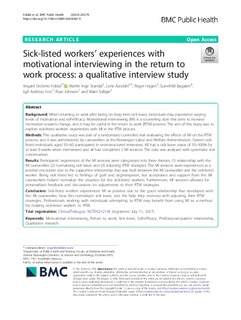| dc.contributor.author | Foldal, Vegard | |
| dc.contributor.author | Standal, Martin Inge | |
| dc.contributor.author | Aasdahl, Lene | |
| dc.contributor.author | Hagen, Roger | |
| dc.contributor.author | Bagøien, Gunnhild | |
| dc.contributor.author | Fors, Egil Andreas | |
| dc.contributor.author | Johnsen, Roar | |
| dc.contributor.author | Solbjør, Marit | |
| dc.date.accessioned | 2020-03-05T08:34:24Z | |
| dc.date.available | 2020-03-05T08:34:24Z | |
| dc.date.created | 2020-02-28T21:17:22Z | |
| dc.date.issued | 2020 | |
| dc.identifier.issn | 1471-2458 | |
| dc.identifier.uri | http://hdl.handle.net/11250/2645393 | |
| dc.description.abstract | Background
When returning to work after being on long-term sick leave, individuals may experience varying levels of motivation and self-efficacy. Motivational interviewing (MI) is a counseling style that aims to increase motivation towards change, and it may be useful in the return to work (RTW) process. The aim of this study was to explore sick-listed workers’ experiences with MI in the RTW process.
Methods
This qualitative study was part of a randomized controlled trial evaluating the effects of MI on the RTW process, and it was administered by caseworkers at the Norwegian Labor and Welfare Administration. Sixteen sick-listed individuals, aged 33–60, participated in semi-structured interviews. All had a sick leave status of 50–100% for at least 8 weeks when interviewed and all had completed 2 MI sessions. The data was analyzed with systematic text condensation.
Results
Participants’ experiences of the MI sessions were categorized into three themes: (1) relationship with the MI caseworker, (2) normalizing sick leave, and (3) adjusting RTW strategies. The MI sessions were experienced as a positive encounter due to the supportive relationship that was built between the MI caseworker and the sick-listed worker. Being sick listed led to feelings of guilt and stigmatization, but acceptance and support from the MI caseworkers helped normalize the situation for the sick-listed workers. Furthermore, MI sessions allowed for personalized feedback and discussions on adjustments to their RTW strategies.
Conclusion
Sick-listed workers experienced MI as positive due to the good relationship that developed with the MI caseworker, how this normalized sick leave, and the help they received with adjusting their RTW strategies. Professionals working with individuals attempting to RTW may benefit from using MI as a method for helping sick-listed workers to RTW. | nb_NO |
| dc.language.iso | eng | nb_NO |
| dc.publisher | BMC (part of Springer Nature) | nb_NO |
| dc.relation.uri | https://bmcpublichealth.biomedcentral.com/articles/10.1186/s12889-020-8382-9#citeas | |
| dc.rights | Navngivelse 4.0 Internasjonal | * |
| dc.rights.uri | http://creativecommons.org/licenses/by/4.0/deed.no | * |
| dc.title | Sick-listed workers’ experiences with motivational interviewing in the return to work process: a qualitative interview study | nb_NO |
| dc.type | Journal article | nb_NO |
| dc.type | Peer reviewed | nb_NO |
| dc.description.version | publishedVersion | nb_NO |
| dc.source.volume | 20 | nb_NO |
| dc.source.journal | BMC Public Health | nb_NO |
| dc.source.issue | 276 | nb_NO |
| dc.identifier.doi | 10.1186/s12889-020-8382-9 | |
| dc.identifier.cristin | 1798576 | |
| dc.relation.project | Norges forskningsråd: 256633 | nb_NO |
| dc.description.localcode | © The Author(s). 2020 Open Access This article is licensed under a Creative Commons Attribution 4.0 International License. | nb_NO |
| cristin.unitcode | 194,65,20,0 | |
| cristin.unitcode | 194,67,40,0 | |
| cristin.unitcode | 1920,24,0,0 | |
| cristin.unitname | Institutt for samfunnsmedisin og sykepleie | |
| cristin.unitname | Institutt for psykologi | |
| cristin.unitname | PH - Tiller distriktspsykiatriske senter | |
| cristin.ispublished | true | |
| cristin.fulltext | original | |
| cristin.qualitycode | 1 | |

